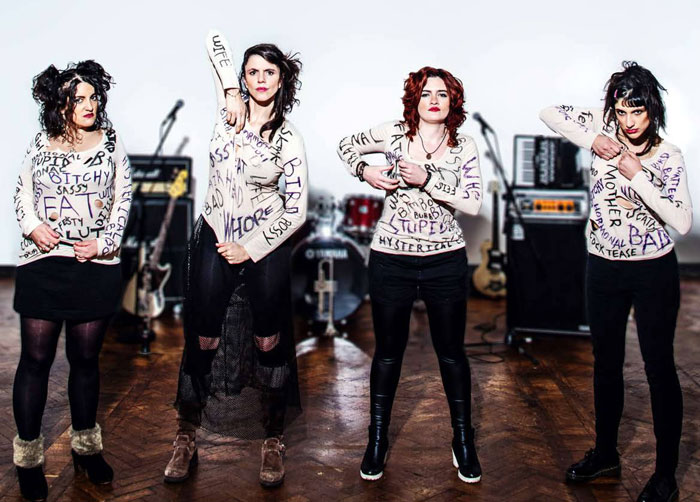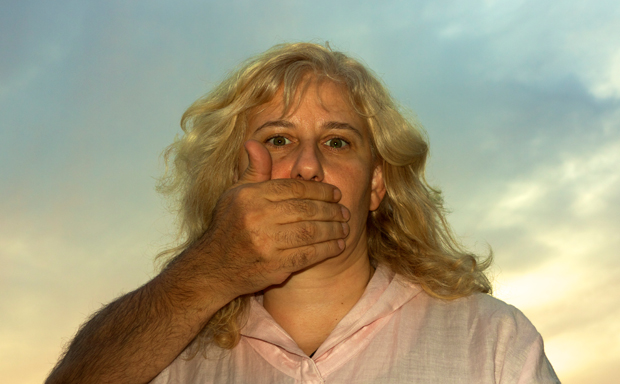Index relies entirely on the support of donors and readers to do its work.
Help us keep amplifying censored voices today.
Meltem Arikan is a Turkish and Welsh author who was short-listed for the Freedom of Expression Award in 2014 by Index on Censorship for her play Mi Minor.
[vc_row][vc_column][vc_column_text]

Enough is Enough, a play formed as a gig, tells the stories of real people about sexual violence, through song and dark humour. It is written by Meltem Arikan, directed by Memet Ali Alabora, with music by Maddie Jones, and includes four female cast members who act as members of a band.
While touring Wales recently with my new play Enough Is Enough, I thought about what I experienced with my earlier work in Turkey. But which Turkey?
In the so-called “New Turkey”, everything is being surveilled by the government, from plays and books to everything you share on social media. There were no undercover Welsh police or prosecutors sitting in the audience in Newport or Pontypridd.
We designed Enough is Enough as a touring project. We went to 21 different Welsh venues in 21 different places, north, south, east and west, in less than a month. Audience members had strong positive reactions and some suggested that the production should be taken into schools. In the New Turkey even thinking about taking the play to schools would be enough to be accused of something unimaginable. If you dared sing the songs sung in Enough is Enough, you can be sure you would receive a violent reaction.
When you confront reality in a direct way, even if it is through art, governments around the world do not want to hear your voice. The New Turkey’s government is only an extreme example. When you speak truths, governments do not want you to be heard – they do not want you at all.
Yet when you show reality in a direct way, when you slap the audience with pain, the reaction becomes the same everywhere. First they are shocked, then they find you unusual, but in the end they compliment you for doing it.
During our tour of Wales, people let us into their hearts, looked after us and many venues promised to invite us again. Audience members shared their stories with us. Many wanted to work with us, others supported us unconditionally.
After every performance we had “shout it all out” sessions. We heard repeatedly how many of the issues we confront on stage – sexual violence, oppression and misogyny – are being swept under the carpet because people don’t like to discuss them.
These sessions took me back to a time before I wrote Mi Minor, the play accused of being a rehearsal for the Gezi Park protests in 2013. A time before I had to leave the country because of those accusations. A time before the innovations in the New Turkey was not as horrifyingly obvious as they are now. A time when the AKP, the ruling party of Turkey, was backed not just by the liberals in Turkey but liberals around the world. Back then I was told I was wrong about the government. It was in 2007 that I wrote a play entitled I am Breaking the Game.
That play premiered in Zurich and toured to Amsterdam, Rotterdam, Istanbul and Ankara. No matter where it was performed there was a particular reaction that stuck with me: “These issues are not our issues, they belong to the East.”
I was inspired by the stories of people I know personally. I was in touch with the victims of domestic violence, honour killings, rape, incest and sexual abuse. I knew all stories were true. So I wasn’t sure why then so many didn’t see these issues as theirs. I searched and searched for this place far away from everyone and everything, where all these horrible things keep happening, called the “East”. Eventually I found myself in the West.
After graduating from the London Academy of Music and Dramatic Art, actor Pinar Ogun felt inspired by Breaking the Game. She felt angry that the run of the play was short in Turkey and she became passionate — almost obsessed — to stage it in London. She tried to convince her instructors at LAMDA, artistic directors of various venues and theatre friends to make it happen. She even introduced me to a couple of people who showed interest, but the reaction was again the same: “Of course these issues are very important but these issues are not our issues, they belong to the East. We resolved these issues in the 1970s. Such plays, performances have been done in the past. These are very old discourses.”
Laurie Penny was one of the only people who had a different reaction. She interviewed me nine years ago: “However much she is hounded by Turkish authorities and tutted at by European theatre goers, one thing is certain: Meltem Arikan is not about to roll over and hush. And thank goodness for that.”
When slapped in the face does it hurt less in the West than in the East?
Why is it considered a social phenomenon when women are killed in the name of honour in the East but an individual crime when women are killed in the name of passion, obsession or jealousy in the West? Child marriage in the East is seen as a nightmare. But, in the West, does calling pregnant children “teen moms” prevent their lives from turning into a nightmare?
After I was forced to leave Turkey and began living in Wales, Ogun restarted her campaign to stage I am Breaking the Game. A year ago, I finally said yes. I’ve been observing a West that has been dazzled by the light of past enlightenments, alienated from its very own issues, attached to the chains of concepts and utterly disconnected to its reality. With Ogun’s company, Be Aware Productions, we applied to Arts Council Wales for research and development funding. But even after the grant was awarded, I was afraid I would still hear the echoes of the long-dead rejection: “These issues are not our issues, they belong to the East”, “the stories of the East”, “The East…”
My rejections, my questions, my issues.
During our research process we met with Welsh sex workers, organisations that help and support women facing violence, and victims. My initial idea was to replace these new stories with the stories in the play, but then I decided to write a new play entirely.
I developed the play with stories of abuse, rape and incest from Britain, all true stories, all had actually happened in these lands. Sometimes I used the exact words of the victims, sometimes I made them more poetic, but most importantly, in order to reach the hearts of the audience, I decided to use the magic of music and that’s how the idea of making it a gig-theatre came to be.
My rejections, my questions, my issues.
When writing Enough is Enough, my intention was to become a megaphone to the people who are facing violence here, to point to the elephant in the room by talking about incest and to underline the fact that when it is about the existence of women and men, those in the West and those in the East were the same.
I dare to say this because I can see blatantly that no matter how much cultures, cuisines, languages, clothes, ethnical backgrounds have managed to differentiate each and every one of us, no matter whether we were born in the West or in the East, we’re all forced to have the life forms designed by the patriarchy and so we are all dominated by the same fears for thousands of years.
Just like the East, the West also lives in its own virtual world built on the concepts of the patriarchal culture. And the relative comfort of this world doesn’t mean a thing for the victims. Just like Turkey, just like France, just like Yemen, just like the USA, women, children and men in Britain become victims. Abuse, rape and incest endlessly continue to exist with all its savagery within society, behind closed doors. The pain and consequences of this ongoing violence continue to be ignored. And while children become the children of fear, not the children of their parents, all around the world violence continues to beget violence. Those who face their pain empathise with victims, whereas those who escape their pain empathise with the perpetrators.
During the Wales tour, the reaction from people who were violated, who knew what violence was, who did not escape from their pain, who faced themselves, who were not in denial of their experiences, in short, the reaction from people who knew the pain of reality, was warm, open and stripped-down. We received the biggest support from women’s organisations, women, some brave men, young people and the LGBT community.
On 8 April 2017 at the Wales Millennium Centre and from the 26-29 April at Chapter Arts Centre, we will continue to say “Enough is Enough”. This time our goal is to reach promoters and artistic directors for an England tour. We want to make our voice be heard in England, and shout “Enough is Enough” together with the English audience.
I really wonder about the reaction of the audience in England. Will they be as open as the Welsh audience or will they keep repeating their apologies while saying these are the East’s problems. The irony is that this time we will be coming from the West, at least west of England.
Yet, whatever the reaction of the audience in England may be, I know for sure there won’t be any audience members who try to organise a mob against us.
Whatever the reaction of the audience in England may be, I know for sure the play would never be banned with the accusation of “disturbing the family order”.
Whatever the reaction of the audience in England may be, I know for sure that newspapers won’t run a smear campaign against the actors because of our play.
Whatever the reaction of the audience in England may be, I know for sure I won’t receive any death threats just because I dared to address violence against women. [/vc_column_text][vc_column_text]

[/vc_column_text][vc_basic_grid post_type=”post” max_items=”4″ element_width=”6″ grid_id=”vc_gid:1491211961521-80d1b694-85da-6″ taxonomies=”8607″][/vc_column][/vc_row]

When drawings being scribbled,
colours dripping red,
words being silenced,
thoughts being limited,
lives turn to nothing,
can you touch pain with politics?
Can you perceive pain with your beliefs?
Lives smeared with blood,
your loved ones lying on the ground
lifeless…
Can you hold on to reason,
and when fear like dark clouds
leaks within everyone,
and when fear feeds more fears
and when fear swells hatred
with its giant steps,
can you cure desperation with laws?
When walls are being built again
for the sake of freedom and security,
with violence and blood,
can you create peace with concepts,
when a person without blinking an eye
can kill another person,
when another can glorify death
for the sake of religion?
The moment you declare
you believe,
if the world stops turning,
if reasoning,
sensibility,
sensitivity,
goes blind against beliefs
and even a pen could be perceived as a weapon,
how can thoughts be free?
What would expressing yourself mean?
This poem was posted on 14 January 2015 at indexoncensorship.org

Meltem Arikan is a Turkish playwright living in the United Kingdom.
“Oh, but of course,
you women have the right to speak!
Oh, but of course,
you have the right to laugh!
Oh, but of course,
you have a say over your bodies…
Oh, but of course,
freedom of expression!”
So they say, but in Turkey,
silence grows daily ever heavier
as the culture of fear expands.
If I shout ‘enough’,
will anyone hear my voice?
My voice…
a woman’s voice…
Aren’t women’s voices equivalent to muteness in Turkey?
As women begin to step outside the frames of their lives,
as modern tools for communication enlighten them about the world beyond,
the more curious they become
the more they inquire
the more they change
the more they demand more from their lives.
They dare to say no,
And they become those dangerous women
who are attempting to break the order…
Women, forced into passivity
scared to be counted as trouble makers,
they must be content to accept
the scraps thrown from men’s tables.
The traditional culture engenders fear
the fear of failure:
failing to satisfy the expanding demands of women
men lose self confidence,
when their constructed masculinity is perceived to be at risk,
they will stoop to violence and kill women and children.
So there are men
who feel that their manhood is under threat,
who take issue with their wives’ increasing demands,
who applaud this authoritarian system of government
as an example of how to deal with these problems.
Authority approves violence towards women,
the young and lesbian,
gay, bisexual and transgender people
by extending clemency to perpetrators of violence
instead of punishing them with the severity they deserve.
So there are men
Who are afraid facing up to their fear and pain.
Recoiling from pain and embarrassment of what has happened to them, rebound towards leaders
who apportion them so called high ideals.
So these men have become as dishonorable as the ones
who govern the country through fear and oppression.
Leaving aside, for the moment,
their antagonism towards organized resistance and protest,
just think: they can’t bear you,
the individual woman,
expressing your feelings
beyond the limitations they’ve decreed.
They can’t control their desire to destroy those
who raise their voices
who show resistance to their flawed dominance.
They’re always on the look-out for
the ‘other’,
an individual
or a group:
a race,
a sect
or a religion
on whom to project their hatred
and take revenge.
To mitigate their pain,
they target women,
the young:
anyone
or anything
that reminds them of their own inadequacies
and limitations.
Oppression first manifests in discourse…
Women are should have three children…
Women unveiled are like houses without curtains,
for rent or sale…
Women confirm that women who are raped
are at fault for wearing low cut dress.
It must be true: it’s reported in the press.
Women should not laugh in public.
Girls and boys must be educated separate.
No matter how much they want,
women can no longer shout out loud.
Enough is enough?
They cannot do it.
Shouting? Forget it!
Any female expression results in accusations,
exclusion and irreversible judgments.
If despite this
a woman insists on speaking her thoughts,
she will get a violent response
or at its extreme,
homicidal.
Perpetrate a greater violence
by politicking over women bodies
A genuine course of action against violence
would entail taking
their hands,
their politics
their ideas off women.
If I shout ‘enough’,
will anyone hear my voice?
My voice…
a woman’s voice…
Aren’t women’s voices equivalent to muteness in Turkey?
This poem was published on Wednesday Sept 17 at indexoncensorship.org